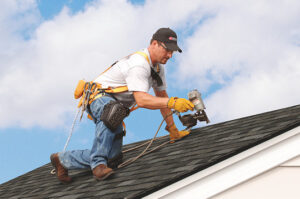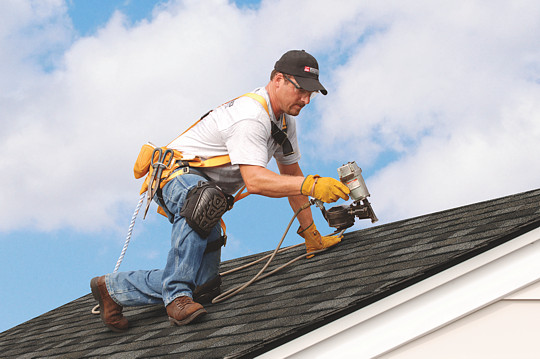If you’re in need of a roofing contractor, word-of-mouth recommendations from friends and family are usually the best way to find one. Also, ask about their licensing requirements and insurance coverage – especially workers’ compensation and liability.
Roofing Contractors South Jersey are construction professionals who oversee all aspects of roof installation. They can also help shepherd projects through the permit and inspection processes. This article will cover tips for finding a trustworthy and knowledgeable local pro to do the job well.
The roofing industry is one of the most specialized fields in construction, so it’s important to hire contractors with experience and knowledge. They should also be able to provide you with a detailed estimate before beginning any work on your roof. This will help you make an informed decision and avoid any unexpected expenses. Ideally, you should also ask about their licensing and insurance to protect yourself from liability if something goes wrong during the project.
Roofing contractors perform many tasks, including installing, repairing, and replacing roofs on residential and commercial properties. They are skilled at using hand tools and can work for long periods of time on ladders or scaffolding. They also know how to handle various types of roofing materials, including shingles. Roofing contractors may also use their skills to assess the structure of a building’s roof and recommend appropriate materials for its repair or replacement.
It’s important to find out whether your roofing contractor is licensed and insured before hiring them for any work on your home. This will protect you from any potential damages and ensure that they have the proper training to complete the job safely. A good contractor will be willing to share their credentials and proof of insurance with you before beginning any work on your property. They should also be able to provide a list of previous clients and their testimonials.
If you’re looking for a quality roofer, it’s a good idea to check out their online reviews. Most people will review their services on Google, but it’s worth checking out specialty websites like Angie’s List or HomeAdvisor too. Look for reviews that mention the contractor’s reliability, skill, and customer service.
Another thing to keep in mind is the timeline of the project. A reputable roofing contractor will be able to provide you with a realistic timeline and discuss any prep work needed beforehand, such as cleaning or ordering materials. They will also inform you of any days you’ll need to be at home during the installation process, as well as the estimated completion date. This will help you set expectations and minimize any frustration if the project runs behind schedule.
Licensing
When choosing a roofing contractor, you should make sure they are licensed. Licensing requirements vary by state and can include a background check, insurance coverage, and in some cases a bond. In addition, many states have training programs that can help you prepare for the licensing process. These training courses usually consist of hands-on work and classroom instruction. In some states, you must also take a test to get your license.
Generally, contractors must be licensed to perform construction work on residential properties. In New York, for example, a contractor who does a “roofing, roof decks, and related sheet metal” project must have a residential rooftop registration. However, there are a number of exceptions to this rule. These exceptions can include repairing gutters and downspouts, insulating, resurfacing, painting, or replacing siding. A general license must be obtained for projects valued at less than $20,000, while a specialty contractor license must be obtained for those projects over that amount.
In order to be a licensed roofing contractor, you must have at least three years of experience and pass a background check. You must also have a workers’ compensation and general liability insurance. Besides this, you must register with the Department of Consumer Protection and pay a fee. This is a good idea to protect yourself from unlicensed roofers who may cause damage to your property or steal your belongings.
Another important thing to remember is that you must have a state license to do roofing in some states. In order to qualify for a license, you must pass a background check and meet the minimum education and experience requirements. You must also complete a pre-licensure course and submit a certificate of insurance and a bond.
It is also a good idea to get insured because the cost of a roofing job can be high. If you don’t have the proper insurance, you might end up paying for expensive repairs or even losing your home. If you are interested in becoming a roofing contractor, start by seeking out entry-level jobs or apprenticeships to learn the necessary skills. You can also take courses in construction, blueprint reading, and carpentry to prepare for the industry.
Insurance
Roofing contractors have unique insurance needs because of the demanding work they do. A general liability policy is often essential, as are workers’ compensation and a commercial auto policy for any vehicles used in the business. Other policies that may be beneficial include professional liability insurance, commercial property coverage and an umbrella insurance policy.
A general liability insurance policy can cover the costs of property damage, bodily injury and legal fees that could arise from a customer or third-party claim. A workers’ compensation insurance policy can pay for medical expenses and lost wages if one of your employees is injured while working on a roof.
In many states, including New York, roofers must have a workers’ compensation insurance policy for their employees. This type of insurance can help pay for doctor visits, disability payments and funeral expenses in the event of a workplace accident. Workers’ compensation also covers lost income for time off to heal.
Commercial auto insurance is required in most states for any vehicle used for business purposes. This includes any trucks, vans or cars owned by the roofing company as well as any vehicles used to transport workers or supplies. You can obtain a commercial auto insurance quote from an independent agency that can compare rates for the best options for your roofing company.
If your roofing business has a location in only one area, a business owner’s policy (BOP) may contain the business property, general liability and workers’ compensation insurance you need for a single premium. However, if your business travels to job sites at different locations, you’ll probably want to purchase a separate inland marine policy, which offers more extensive protection for equipment and materials shipped from place to place.
A roofing contractor should also consider a professional liability insurance policy to cover any errors in roofing installation, maintenance, or repair. This type of policy can cover your legal fees if you’re sued for negligence and will usually pay any damages awarded against you. If you’re not sure whether this is an important policy for your roofing company, ask other roofing contractors about their experience with it.

